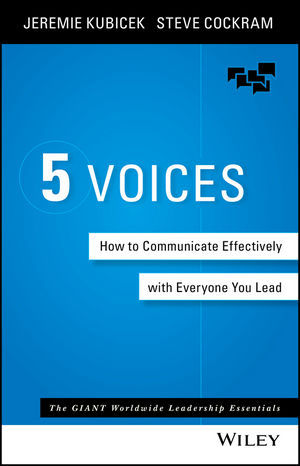Each of us has a ‘voice’ with a corresponding set of characteristics, but which type are you? In a new book, Jeremie Kubicek & Steve Cockram share their insight into personality types
Many people have run the gauntlet of personality tests and come away without a proper understanding of how personality wiring is mixed with historical experiences and personal choices. In our latest book, we simplified the complicated personality process by creating five voices. Each has particular attributes that make it recognisable, as well as typical behaviour tendencies. Everyone has the capacity to use all five voices but some of them are more natural to us and dominant than others.
The vocabulary of 5 Voices is beneficial in understanding the relative strengths of people. When this language begins to take root, it becomes easier to have honest conversations as people begin to understand the context of each voice and speak to the voice with clarity.
WHICH TYPE ARE YOU?
1. Nurturer
All of the voices are naturally hardwired to do certain things well. For nurturers, that thing is caring for others and helping to develop the people around them.
“Whatever the context of the relationship, be it family, work, or the larger community, nurturers are amazing keepers of relationships and defenders of values.
In the same way engine oil is essential for a car to run, so too is the nurturer voice necessary in building and maintaining relationships.
Focused on the here and now, nurturers make it a priority to know what the people in their circle of care need and value, and their innate desire for relational harmony gives them an intuitive ability to understand what to do to meet those needs, both spoken and unspoken.
Nurturers tend to have quieter voices and can be drowned out and bullied by other louder voices. As such, nurturers can begin to question their value when they don’t feel heard.
Groups and teams suffer without the contribution of secure, confident nurturers, and those who lead nurturers must provide an environment where they feel safe to contribute their best.
2. Creative
The creative voice is another quiet voice that can be hard to hear, especially when in the presence of loud, opinionated voices like the connectors and pioneers.
The creative genius, which possesses an extraordinary gift for visioning the future, can easily be missed.
Creatives are amazing conceptual architects and love scanning the horizon; they are often drawn to new trends in ideas and technology. They come equipped with an early warning radar system that gives them the ability to sense danger where values run the risk of being compromised, and they can see opportunities, solutions, and possibilities for the future long before they become reality.
The creative voice invariably prefers to listen and process other contributions internally before responding. When asked for input, often their first thoughts come out in a way that others find confusing or even critical – they need others to invest time, asking them clarifying questions, which gives them the space to allow the right answer to surface. When other voices are patient in this process, they will be amazed at the gold a creative is able to contribute.
“Creatives are invariably idealists and internal perfectionists who also have a strong social conscience.
Creatives need to know it’s safe to share their ideas; if they get shot down too often, or judged on their initial input, they will stop bringing their best.
3. Guardian
By their very nature, guardians are wired to preserve and protect. Their voice is louder, though not the loudest, and guardians exist to ensure that what is already established is not going to be lost as the more future-orientated voices seek adventure on new frontiers.
Like the nurturer, guardians are present-oriented; they like to ask detailed, analytical and critical questions. They are not afraid to address tough or awkward issues, and, unless they are convinced, you can expect guardians to put the brakes on when it comes to any kind of change where money, energy, or other resources could be potentially lost or wasted.
“Though they dislike compromise and have to beware of their tendency to interrogate, no one can deliver projects on time or on budget like a guardian.
4. Connector
The connector voice is the next loudest voice in succession from the guardian and best recognised as someone who is a genius at connecting people and their aspirations to ideas and resources.
The quintessential people person, expect someone with a foundational connector voice to have a large number of close friends and to always make contacts and new relationships everywhere she goes.
“Known for their charisma and gift for being persuasive messengers, you can be sure that connectors will do their level best to encourage everyone to buy into whatever they are excited about.
Though focused on the big picture of the future, connectors have an intuitive ability to sense what others feel and need in the moment, which is what gives them their uncanny ability to connect people to opportunities.
Connectors have to beware of their need to receive credit for their ideas and their tendency to be people pleasers, but when they are healthy, affable and resourceful connectors are a unifying force in a group or on
a team.
5. Pioneer
We’ve saved the most dominant and loudest voice for last. If you are a pioneer, you may not enjoy going last, as going first, being first, being out in front is a primary characteristic of the pioneer and, indeed, where pioneers function at their very best.
“With eyes and mind focused on the horizon, the pioneer is always gunning for the next
big breakthrough.
With an unparalleled ability to think strategically, pioneers are experts at aligning people, systems and resources to deliver big-picture visions. And although hard charging and quite opinionated, they have a gift for painting a compelling vision of the future and inviting people to be at their table.
Their motto is invariably, ‘Go big or go home’, and although their big ideas are what launch new companies, great products or the next big adventure, if they want people to be part of their experience, they have to be mindful of the strength of their voice and critique.
This article is based on 5 Voices: How to Communicate Effectively with Everyone You Lead by Jeremie Kubicek & Steve Cockram, published by Wiley.





